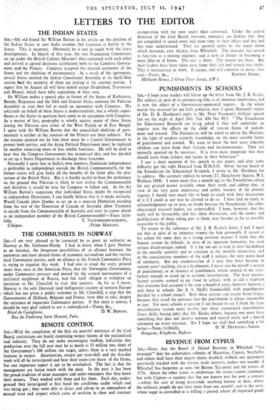REMOTE CONTROL
SIR,—With the completion of the first six months' existence of the Coal Board, statisticians are busily examining output figures of the nationalised coal industry. They do not make encouraging reading, indicating that production over the full year may be as much as 15 million tons short of the Government's 200 million ton target, unless there is a very marked increase in output. Absenteeism, output per man-shift and the five-day week will all be investigated and bear their respective share' of the blame, but one important aspect is apt to be overlooked. The fact is that the management are losing touch with the men. In the past it has been the proud tradition of mine managers and under-managers that they knew their miners. They worked with them and for. them. Each day, under- ground they investigated at first hand the conditions under which coal was being got ; they were able to direct and advise in an atmosphere of mutual trust and respect which came of working in close and constant
co-operation with the men under their command. Under the central direction of the Coal Board, however, managers are finding that they are compelled to spend more and more time in their offices and less and less time underground. They are snowed under by the paper storm which descends, ever thicker, from Whitehall. The manager has ceased to function as a mining engineer, and is now in danger of becoming a mere filler-in of forms. The coal is there. The miners are there. But their leaders have been taken away from their job and turned into clerks. This is bureaucracy at work. It means, and will continue to mean—less
coal.—Yours, &c., RAWDON HOARE. Millbank House, 2 Great Peter Street, S.W.1.


































 Previous page
Previous page